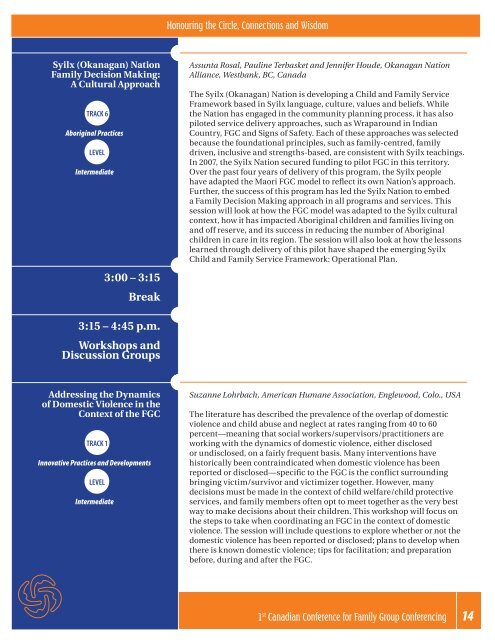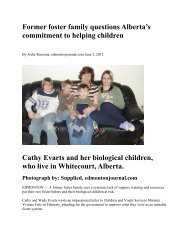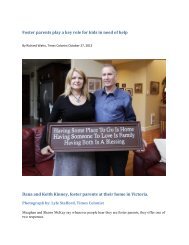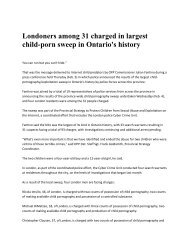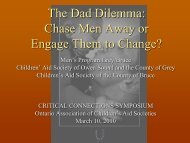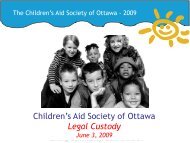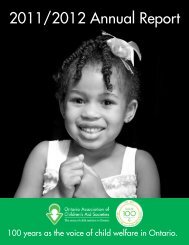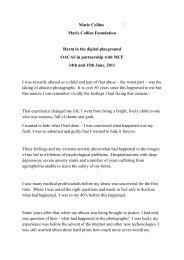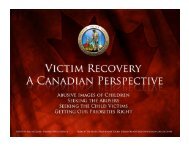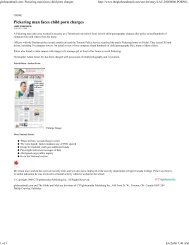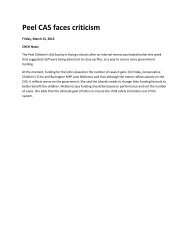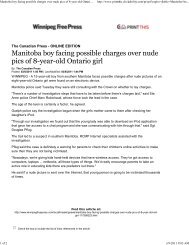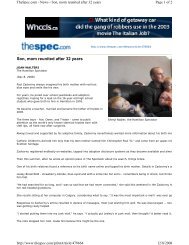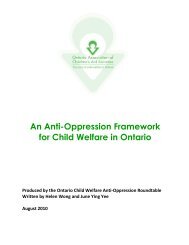PROGRAM GUIDE - American Humane Association
PROGRAM GUIDE - American Humane Association
PROGRAM GUIDE - American Humane Association
Create successful ePaper yourself
Turn your PDF publications into a flip-book with our unique Google optimized e-Paper software.
Honouring the Circle, Connections and Wisdom<br />
Syilx (Okanagan) Nation<br />
Family Decision Making:<br />
A Cultural Approach<br />
TRACK 6<br />
Aboriginal Practices<br />
LEVEL<br />
Intermediate<br />
3:00 – 3:15<br />
Break<br />
Assunta Rosal, Pauline Terbasket and Jennifer Houde, Okanagan Nation<br />
Alliance, Westbank, BC, Canada<br />
The Syilx (Okanagan) Nation is developing a Child and Family Service<br />
Framework based in Syilx language, culture, values and beliefs. While<br />
the Nation has engaged in the community planning process, it has also<br />
piloted service delivery approaches, such as Wraparound in Indian<br />
Country, FGC and Signs of Safety. Each of these approaches was selected<br />
because the foundational principles, such as family-centred, family<br />
driven, inclusive and strengths-based, are consistent with Syilx teachings.<br />
In 2007, the Syilx Nation secured funding to pilot FGC in this territory.<br />
Over the past four years of delivery of this program, the Syilx people<br />
have adapted the Maori FGC model to reflect its own Nation’s approach.<br />
Further, the success of this program has led the Syilx Nation to embed<br />
a Family Decision Making approach in all programs and services. This<br />
session will look at how the FGC model was adapted to the Syilx cultural<br />
context, how it has impacted Aboriginal children and families living on<br />
and off reserve, and its success in reducing the number of Aboriginal<br />
children in care in its region. The session will also look at how the lessons<br />
learned through delivery of this pilot have shaped the emerging Syilx<br />
Child and Family Service Framework: Operational Plan.<br />
3:15 – 4:45 p.m.<br />
Workshops and<br />
Discussion Groups<br />
Addressing the Dynamics<br />
of Domestic Violence in the<br />
Context of the FGC<br />
TRACK 1<br />
Innovative Practices and Developments<br />
LEVEL<br />
Intermediate<br />
Suzanne Lohrbach, <strong>American</strong> <strong>Humane</strong> <strong>Association</strong>, Englewood, Colo., USA<br />
The literature has described the prevalence of the overlap of domestic<br />
violence and child abuse and neglect at rates ranging from 40 to 60<br />
percent—meaning that social workers/supervisors/practitioners are<br />
working with the dynamics of domestic violence, either disclosed<br />
or undisclosed, on a fairly frequent basis. Many interventions have<br />
historically been contraindicated when domestic violence has been<br />
reported or disclosed—specific to the FGC is the conflict surrounding<br />
bringing victim/survivor and victimizer together. However, many<br />
decisions must be made in the context of child welfare/child protective<br />
services, and family members often opt to meet together as the very best<br />
way to make decisions about their children. This workshop will focus on<br />
the steps to take when coordinating an FGC in the context of domestic<br />
violence. The session will include questions to explore whether or not the<br />
domestic violence has been reported or disclosed; plans to develop when<br />
there is known domestic violence; tips for facilitation; and preparation<br />
before, during and after the FGC.<br />
1 st Canadian Conference for Family Group Conferencing 14


